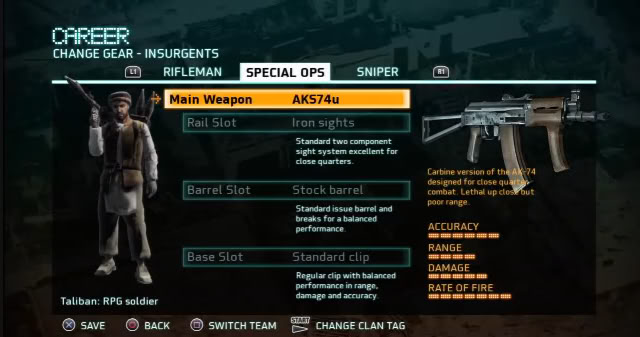This morning, Medal of Honor producer Greg Goodrich announced that the multi-player faction previously identified as the Taliban would from this point forward be known simply as “Opposing Force.” Goodrich said that the change was the result of a desire not to offend “the men and women serving in the military and…the families of those who have paid the ultimate sacrifice.”

This conciliatory attitude is in stark contrast to EA CEO John Riccitiello’s tone back in September when he lashed out at an unnamed journalist for trying to generate controversy by “[putting] the game box in front of a mom who'd lost her son in Afghanistan.” He went on to suggest that the real problem was that a “non-gamer” just couldn’t understand the situation.
Riccitiello’s statement ignored the fact that more than a few gamers were also offended by EA’s decision. Destructoid’s Hamza CTZ Aziz wrote personally and eloquently about his discomfort with controlling members of an organization whose decades of brutality have negatively impacted thousands of lives worldwide. His piece attracted harsh criticism from readers, but once again raised the question of whether developers’ insensitive decisions can be excused with a dismissive “It’s just a video game.”
While I appreciated and sympathized with Aziz’s article, I was never really offended by the presence of the Taliban in Medal of Honor. This was mainly because the game was just using them as a skin for a multi-player faction, not asking players to participate in their atrocities. But I was also not offended for the same reason I’m not bothered by what performers like Glenn Beck or Sarah Silverman say in their acts. In all cases, the desire to get attention through being shocking is so obvious that it’s impossible to actually be shocked.
At the same time, I can’t get on board with those who see this as a blow to free speech. For one thing, EA backed down voluntarily. Sure, stores on U.S. military bases had refused to carry the game; but with the publisher announcing yesterday that Medal of Honor had broken the franchise’s previous record for pre-orders, how much could that have really factored into this decision? There are far more important free speech issues to worry about than one of the world’s biggest video game publishers choosing to end what has always looked like a viral marketing campaign.
Even if this controversy was intentionally created by EA, it has raised a host of issues about how real-life conflicts are portrayed in video games. How soon is too soon? How much should developers self-censor, if at all? Is it ever all right to put players into the shoes of “the bad guys” in such conflicts? Here’s hoping that EA’s decision, whether you agree with it or not, creates a less emotionally charged environment in which we can discuss those questions.


